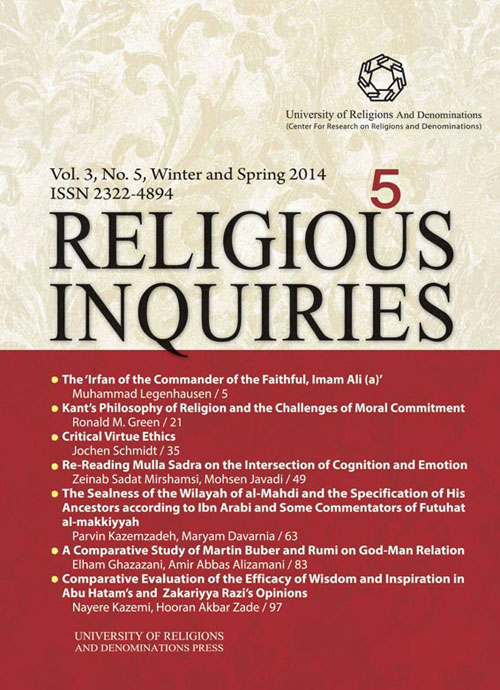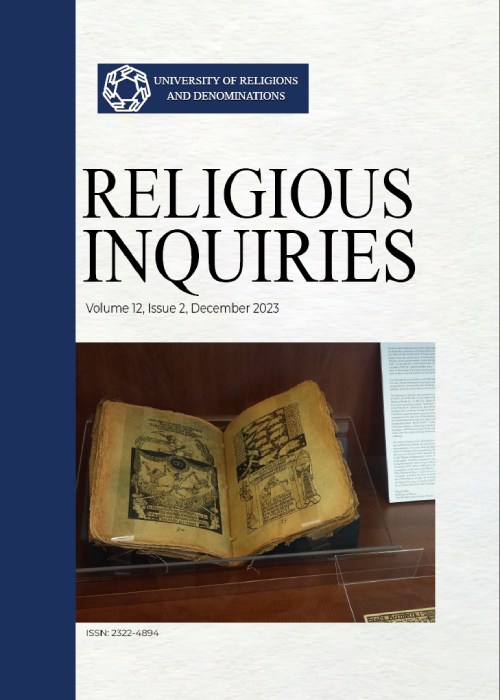فهرست مطالب

Religious Inquiries
Volume:3 Issue: 1, Winter and Spring 2014
- تاریخ انتشار: 1395/05/20
- تعداد عناوین: 7
-
-
Pages 5-20All of the major branches of Islamic mysticism, irfān, refer to Imam Ali (a) as a major source for their teachings and practices. Hence, we begin with a review of how the mystics viewed Imam Ali (a). After this we consider some controversies about the nature of irfān and its relationship to Sufism, for the terms have been used in different ways. Then we turn to the sources on the basis of which claims may be defended about the irfān of Imam Ali (a). The conclusion is that the irfān of Imam Ali (a) may be characterized by the following features: (1) irfān consists of both knowledge by presence and conceptual knowledge of God. The conceptual knowledge may be divided into theoretical and practical knowledge as reflections upon the experiential knowledge of God and the way of achieving and deepening it; (2) the way to irfān is the path from the outward to the inward, from ẓāhir to bāţin; (3) Imam Alī (a) is a fully realized human being who has achieved this knowledge at its most profound level, and who serves as a guide in this quest for those who seek God; (4) the knowledge possessed by the Imam makes him a place for the manifestation of the divine Names and Attributes; (5) the way requires God-wariness (taqwā), renunciation of the world, setting ones sights on the ultimate goal, worship, obedience, the acquisition of virtue, and self-knowledge; through the remembrance (dhikr) and contemplation (fikr) of God one polishes the heart and sets out on the inner journey; (6) the way is perilous. Misunderstandings occur when one learns of truths beyond ones capacity; (7) different people are capable of various degrees of knowledge.Keywords: irfān, Sufism, Imam Ali (a), spiritual path, theoretical mysticism, practical mysticism, remembrance of God, contemplation of God
-
Pages 21-34Kant believes that the concepts of a just and compassionate God and the life beyond death spring from our rational need to unite happiness with virtue. But since Kant had banished happiness from any place in moral reasoning, his philosophy of religion have been deemed as not merely discontinuous with his ethics but radically opposed to it. This article tries to argue against this apparent inconsistency and show that Kants philosophy of religion is in fact based firmly on his ethical reasoning.Keywords: Philosophy of religion, moral commitment, Happiness, virtue, ethical reasoning
-
Pages 35-47Since the publication of Anscombes famous paper Modern Moral Philosophy (1958), virtue ethics has become a matter of discussion among scholars. At least four charges have been raised against virtue ethics, one of which is the charge of promoting undue enthusiasm regarding the moral fitness of human beings. This article explores the limits of virtue ethics with regard to the frailty of human virtuousness. After giving a report of the charges raised against virtue ethics from the perspective of empirical ethics, the author presents the idea of what he would like to call critical virtue ethics as seen by three Lutheran thinkers: Immanuel Kant, Friedrich Nietzsche and Martin Luther himself. He will demonstrate that the empirical contestation of virtue ethics shows a remarkable resemblance to insights found in Luther, Kant and Nietzsche. And finally, the writer draws tentative conclusions about the future of critical virtue ethics.Keywords: Virtue ethics, empirical ethics, Immanuel Kant, Friedrich Nietzsche, Martin Luther
-
Pages 49-61Human emotions are in connection with his deeds on the one hand and his perceptions on the other, and this complicates the analysis of emotion. Furthermore, any school of thought in search of presenting a comprehensive perspective on the human should clarify its stance with regard to emotion and the position it has in the structure of human cognition and deeds. This fact places the answer to the following questions in the field of philosophical anthropology: Does perception have a role in the development of emotions? Are emotions voluntary or involuntary like hunger and thirst? Is human soul passive in the creation of emotions, or does it play an active role? Is it possible to judge the reasonableness or unreasonableness of an emotion as a state that is mainly considered in contrast with rationality? Do all individuals experience similar affective states in similar conditions? In other words, are emotions typical or individual? In this paper, we try to answer these questions from the perspective of the forerunner of Transcendental Philosophy, Mulla Sadra Shirazi.Keywords: Emotion, Mulla Sadra, Practical Reason, Perception, deed, character, pleasure, pain
-
Pages 63-81The sealness of wilayah is one of the most important and challenging issues discussed by Muslim mystics, and has been discussed by the likes of Ibn Arabi. Like other mystics, Ibn Arabi divides wilayah into two types: absolute and limited. However, his ideas with regards to instances of absolute wilayah and limited wilayah diverge from the norm. Sometimes this divergence is so extreme that according to him, it goes away from what is generally accepted by Sunnis and Shiis. In other places, however, he implies that his opinion is similar to some of theirs and that he shares the same opinion as them. Ibn Arabi considers Jesus as an instance of absolute wilayah and an Arab man as an instance of limited wilayah. Sometimes, he takes the Mahdi as an instance of limited wilayah and at other times, he says that the Mahdi of the last days is not the same as the expected Mahdi. In many places, Ibn Arabi introduces himself as the seal of limited wilayah. What is clear, however, is that there are serious differences between numerous copies of Futuhat and its commentaries concerning the names of the ancestors of the Mahdi, and this has so far been neglected. By comparing numerous copies of Futuhat and its commentaries, the present article aims to study, analyze, and criticize such differences.Keywords: Ibn Arabi, seal of wilayah, Jesus, Mahdi
-
Pages 83-95The issue of relation, particularly that of human relation to God stands for one of the most significant concerns by all men of faith. To realize such a relation Martin Buber and Rumi, two globally acclaimed thinkers, have appropriated independent existences for both God and man to make them eligible for having a relation to each other, and they have brought this relationship to the fore in their works. By studying the ideas of these two thinkers we will come to be familiar with a God who has allowed His servants to have a relation with Him and address Him as Thou in communication with Him. Man can touch the factors and causes involved in relation-developing and the types of relations with God by introducing himself into the possibility of engaging in such a relation. According to both thinkers, getting oneself related to God features the highest levels of relations. One of the most crucial factors in arriving at God is developing a relation with the other. The other is in fact a radiation of God or the eternal Thou. Hence the basic condition for realization of such a relation is developing a relationship with the other, and in Martin Buber's words, entering the I-Thou dynamic. According to Buber, what obstructs one in entering this relation is the I-It relation and getting stuck with it. In their works, both Buber and Rumi have clearly explained the levels of relation and unveiled the possibility and realization of such a relation by articulating how one can touch that relation for the people of spiritual path.Keywords: God, Relation, the Other, Encounter, I, Thou, I, It
-
Pages 97-108The question has always been raised throughout history whether human beings need to follow the prophets or divine revelation to achieve salvation. There will be no need, as some believe, to follow divine teachings once human beings reach intellectual maturity; however, others insist on the permanent need for Guidance from God due to inadequacy of human reason. In the third or fourth century AH, two thinkers from Rey with two different perspectives had a debate on the necessity of prophethood. One side of the debate was Abu Hatam Razi, the great Ismaili scholar who advocated the necessity of revelation and prophets; the other side was Muhammad b. Zakariyya Razi, a rationalist physician and philosopher, who allegedly assumes that all human beings are the same in terms of reason and that is why he sees no need for prophets to guide them. This debate, which took place in the presence of the ruler of Rey, is recorded by Abu Hatam in his book Proofs of Prophecy. Given that he is an Ismaili scholar, we explore Ismaili tenets in the analysis of his opinions. We provide an analysis of this debate, in addition to a brief presentation of the ideas of both thinkers on the position of reason and revelation, which helps us understand whether Muhammad b. Zakariyya is truly a heretic.Keywords: prophecy, Reason, Abu Hatam Razi, Zakariyya Razi, Talimiyya


